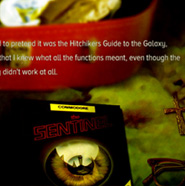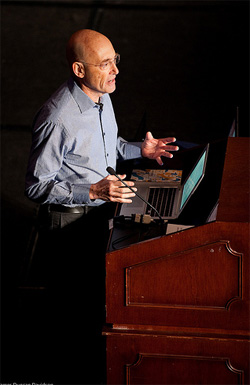Publishing Talks: David Wilk interviews Andy Campbell
October 8, 2010 by David
Filed under Ebooks and Digital Publishing, PublishingTalks, Technology, The Future
 In this series of interviews, called Publishing Talks, I have been talking to book industry professionals and other smart people about the future of publishing, books, and culture. This is a period of disruption and change for all media businesses. We must wonder now, how will publishing evolve as our culture is affected by technology, climate change, population density, and the ebb and flow of civilization and economics?
In this series of interviews, called Publishing Talks, I have been talking to book industry professionals and other smart people about the future of publishing, books, and culture. This is a period of disruption and change for all media businesses. We must wonder now, how will publishing evolve as our culture is affected by technology, climate change, population density, and the ebb and flow of civilization and economics?
I hope these Publishing Talks conversations will help us understand the outlines of what is happening, and how we might ourselves interact with and influence the future of publishing as it unfolds.
These interviews give people in and around the book business a chance to talk openly about ideas and concerns that are often only talked about “around the water cooler,” at industry conventions and events, and in emails between friends and they give people inside and outside the book industry a chance to hear first hand some of the most interesting and challenging thoughts, ideas and concepts being discussed by people in the book business.
When I recently accidentally discovered the work of UK writer Andy Campbell, I was completely blown away. First because the work is so good, imaginative, creative that makes full use of the digital environment to tell stories in a thoroughly new way. But second, simply because I was so surprised that he had been doing this work for so long, and I had never learned of it before now. It’s just proof that the creative world we inhabit is so vast and full of creative individuals, fragmented and as full of stars as the night sky. And it is great fun to find new kinds of writers and writing, and learn so much from their own experiences.
Andy Campbell is a digital writer who has been working at the forefront of digital fiction since 1994. He is the author of Dreaming Methods, a website described by the UK’s Times Educational Supplement as “One of the most impressive purveyors of the new art of internet reading… a distinctive voice that couldn’t be replicated in print.” He is also co-director of One to One Productions Ltd, creating and facilitating multimedia projects for charities, arts organizations and others.
Andy is great fun to talk to, has some valuable insights and thoughts about the emergence and future of digital storytelling, and I hope this talk will gain him some new readers for his really exciting story telling. I think his work represents a profound shift in the way our culture imagines and tells its stories. (below a small screenshot from Nightingales Playground – “a young man attends a school reunion only to discover none of his old friends remember the same things he does”). Do visit Dreaming Methods, it is well worth the time to explore (and support this digital innovator by subscribing).
Podcast: Play in new window | Download
Publishing Talks: David Wilk interviews Ron Martinez
September 27, 2010 by David
Filed under Ebooks and Digital Publishing, PublishingTalks, Technology, The Future
 In this series of interviews, called Publishing Talks, I have been talking to book industry professionals and other smart people about the future of publishing, books, and culture. This is a period of disruption and change for all media businesses. We must wonder now, how will publishing evolve as our culture is affected by technology, climate change, population density, and the ebb and flow of civilization and economics?
In this series of interviews, called Publishing Talks, I have been talking to book industry professionals and other smart people about the future of publishing, books, and culture. This is a period of disruption and change for all media businesses. We must wonder now, how will publishing evolve as our culture is affected by technology, climate change, population density, and the ebb and flow of civilization and economics?
I hope these Publishing Talks conversations will help us understand the outlines of what is happening, and how we might ourselves interact with and influence the future of publishing as it unfolds.
These interviews give people in and around the book business a chance to talk openly about ideas and concerns that are often only talked about “around the water cooler,” at industry conventions and events, and in emails between friends and they give people inside and outside the book industry a chance to hear first hand some of the most interesting and challenging thoughts, ideas and concepts being discussed by people in the book business.
Ron Martinez, is Managing Partner and Co-Founder of Invention Arts. His primary focus is on [aerbook], a web-based publishing and marketing platform that helps books and potential readers find one another on the social web (www.aerbook.com). Ron is a prolific inventor, with close to a hundred and fifty issued patents and patent applications currently in flight. He brings a combination of, technical, creative, intellectual property development and management, design, and strategic and operational business experience to his work at Invention Arts, and finds that his initial interest in computing as an expressive medium continues to define his agenda.
His introduction to the medium was in the mid-80’s, when he was an aspiring novelist in New York, writing YA adventure books, contributing to humor anthologies, writing comics for Heavy Metal and other publications–anything to put food on the table. A book packager asked him to adapt an Arthur C. Clarke novel, Rendezvous with Rama, to graphic adventure format, perhaps the first major author’s works to be so adapted. Taken with the expressive possibilities of the medium, Ron taught himself to program software and built an interactive fiction system, and went on to use that and enhancements to it, as well as entirely new systems, to write interactive fiction, original murder mysteries, political simulations, and other titles for publishers like Simon & Schuster, Spinnaker, Philips Interactive Media, Electronic Arts, and others. By the mid-90’s he was deeply interested in the design of story-rich, massively multiplayer online games. His game 10Six was one of the first of these, a social/tribal million player game published and operated by Sega. (Though built in the late 90’s, it continues to thrive as an indie game at ProjectVisitor.com. 10six introduced ownable, transactable virtual goods for the first time, a technology Ron was awarded a foundational patent for in 2001. Virtual goods models have since emerged as a dominant form of commerce for social networks and social games.
Prior to his current work at Invention Arts, Ron worked for a number of years as Vice President, Intellectual Property Innovation for Yahoo! There he designed and built the IP Innovation function which over a four year period delivered high volume targeted, patentable IP and productizable innovation. He also initiated Yahoo!’s content IP asset management and operations program, implementing a global, real-time rights infrastructure called Rights Engine.
His interests include invention techniques; the evolution of books and the current reimplementation of the publishing industry, intellectual property strategy; content rights; content IP and social distribution; electronic payments; virtual property; online payments; networked games; educational software; social media; social media advertising and marketing; social media monetization; mobile media; media metadata; media sharing and reuse; media remixing; and distributed media production.
It was from Ron’s announcement of Aerbook that I learned of his work. I was very excited as soon as I began exploring this project, because it launched just as I have been thinking about the implications of publishing as a social endeavor in the digital universe. Aerbook in fact is created around the notion of book as a multi-channel conversation between writers and readers, and I think it demonstrates concretely how powerfully publishing can be re-imagined. Ron’s experience as a writer who has mastered the skills and tools of software development and storytelling in a digital environment also brings forward the changes in how writers can work in this new environment. I hope you will find this discussion as interesting and thought provoking as it was for me talking to Ron Martinez. I think we are just now seeing the true beginnings of a “modern” form of publishing that will in fact expand the reach of writers and change their relationships with readers for the good of all.
Podcast: Play in new window | Download
Publishing Talks: David Wilk interviews Peter Brantley
September 12, 2010 by David
Filed under Ebooks and Digital Publishing, PublishingTalks, The Future
 In this series of interviews, called Publishing Talks, I have been talking to book industry professionals and other smart people about the future of publishing, books, and culture. This is a period of disruption and change for all media businesses. We must wonder now, how will publishing evolve as our culture is affected by technology, climate change, population density, and the ebb and flow of civilization and economics?
In this series of interviews, called Publishing Talks, I have been talking to book industry professionals and other smart people about the future of publishing, books, and culture. This is a period of disruption and change for all media businesses. We must wonder now, how will publishing evolve as our culture is affected by technology, climate change, population density, and the ebb and flow of civilization and economics?
I hope these Publishing Talks conversations will help us understand the outlines of what is happening, and how we might ourselves interact with and influence the future of publishing as it unfolds.
These interviews give people in and around the book business a chance to talk openly about ideas and concerns that are often only talked about “around the water cooler,” at industry conventions and events, and in emails between friends and they give people inside and outside the book industry a chance to hear first hand some of the most interesting and challenging thoughts, ideas and concepts being discussed by people in the book business.
Peter Brantley is the Director of the Bookserver Project at the (totally cool) Internet Archive, a San Francisco-based not for profit library. He contributes regularly to several blogs on libraries and publishing, discussing transformations in media and information access. He serves on the board of the International Digital Publishing Forum, the standards setting body for digital books. Peter has significant experience with academic research libraries and digital library development programs, and was previously the Executive Director of the Digital Library Federation, a not for profit membership organization of research and national libraries.
As Peter pointed out to me recently, the word “rant” is a part of his name. So we could expect him to have something interesting to say about almost any subject related to books and the digital landscape. I think that comes across well in our talk. He brings to bear his experience as a librarian but also has a broad perspective on many subjects simply because he pays attention to so many ideas and developments across a wide spectrum of subject areas and interest groups. We had a lot of fun talking together, and hope listeners will enjoy our talk as well.
I am happy to say that this is the 100th post on Writerscast, a milestone of sorts, I suppose.
Podcast: Play in new window | Download
Publishing Talks: David Wilk Interviews Adam Hodgkin
August 2, 2010 by David
Filed under Ebooks and Digital Publishing, PublishingTalks, Technology, The Future
 In this series of interviews, called Publishing Talks, I have been talking to book industry professionals about the future of publishing, books, and culture. This is a period of disruption and change for all media businesses. How will publishing evolve as our culture is affected by technology, climate change, population density, and the ebb and flow of civilization and its economics?
In this series of interviews, called Publishing Talks, I have been talking to book industry professionals about the future of publishing, books, and culture. This is a period of disruption and change for all media businesses. How will publishing evolve as our culture is affected by technology, climate change, population density, and the ebb and flow of civilization and its economics?
I hope these Publishing Talks conversations will help us understand the outlines of what is happening, and how we might ourselves interact with and influence the future of publishing as it unfolds.
These interviews give people in the book business a chance to talk openly about ideas and concerns that are often only talked about “around the water cooler,” at industry conventions and events, and in emails between friends and they give people inside and outside the book industry a chance to hear first hand some of the most interesting and challenging thoughts, ideas and concepts being discussed by people in the book business.
Adam Hodgkin is one of the three publishing and technology experienced founders of Exact Editions, which started as a digital publishing solution for magazines to run on the iPhone (and of course now on the iPad as well). Exact Editions enables magazine publishers to sell “in-app” subscriptions, and notably, preserves the notion of the designed page, something that has been a concern for many publishers of illustrated books as well. I’ve been reading the Exact Editions blog for some time and have been impressed with Adam’s understanding of the emerging digital publishing universe. Something he wrote recently caught my attention immediately, as I have long been interested in the ways that authors, publishers and readers will learn to connect with one another in the online environment. Here’s what Adam wrote about the Apple environment upon which EE is built:
“The Apple e-commerce system works extremely well in my view and with the freemium method that we are adopting at Exact Editions it works in a way in which the ratios between ‘sampling’ and ‘purchasing’ are extremely informative. And as we get more data and get on top of it and learn how to do SRO (SampleRevisionOptimisation – a bit like SEO and it will be an equally dark art) the business of presenting the right amount of content to optimise sales will be established. We currently recommend working at about 8-15% exposure, but its guesstimatory at this point. Amazon must know quite a lot about this from their system, but I am not sure if they have issued any guidance to publishers.
The Apple system is better than most physical bookshops because it can put ‘samples’ in the hands of thousands (many thousands) of potential subscribers/purchasers much more efficiently than can be done with printed paper pages. The economics of this are pretty compelling even if the ‘sample’ to ‘purchase’ ratio is as low as 1%. And in most cases its quite a bit higher than that.
Will probably blog something a bit more informative about this in the next few days. But just let me say that I am simply ASTONISHED by how much more takeup there is for the iPad than for the iPhone. More in absolute terms, by quite a margin, even though there are maybe 40X as many iPhone/IPod touches in the market than iPads.
The iPad is turning out to be a hugely strong reading environment. Absolutely no question about it. And its darn easy to buy stuff on it that you might want to read.”
I thought it would be interesting to talk to Adam about Exact Editions and some of the things he and his colleagues have learned through the experience of working in the Apple environment, not only with magazine publishers but now as they are expanding into working with book publishers as well. My discussion with Adam covered his background and experience in traditional publishing, technology, and some of the lessons learned by the Exact Editions team in their work in digital publishing apps and proved to be as compelling as I had expected.
Podcast: Play in new window | Download
Publishing Talks: David Wilk interviews Bob Stein
July 18, 2010 by David
Filed under Ebooks and Digital Publishing, PublishingTalks, Technology, The Future
 In this series of interviews, called Publishing Talks, I have been talking to book industry professionals about the future of publishing, books, and culture. This is a period of disruption and change for all media businesses. How will publishing evolve as our culture is affected by technology, climate change, population density, and the ebb and flow of civilization and its economics?
In this series of interviews, called Publishing Talks, I have been talking to book industry professionals about the future of publishing, books, and culture. This is a period of disruption and change for all media businesses. How will publishing evolve as our culture is affected by technology, climate change, population density, and the ebb and flow of civilization and its economics?
I hope these Publishing Talks conversations will help us understand the outlines of what is happening, and how we might ourselves interact with and influence the future of publishing as it unfolds.
These interviews give people in the book business a chance to talk openly about ideas and concerns that are often only talked about “around the water cooler,” at industry conventions and events, and in emails between friends and they give people inside and outside the book industry a chance to hear first hand some of the most interesting and challenging thoughts, ideas and concepts being discussed by people in the book business.
Bob Stein is for me one of the great visionary innovators and someone I greatly admire. He most recently co-founded The Institute for the Future of the Book, which quite modestly describes itself as “a small think-and-do tank investigating the evolution of intellectual discourse as it shifts from printed pages to networked screens. We are funded generously by the MacArthur Foundation, and affiliated with the University of Southern California. We are located in Brooklyn, NY and London, UK.” Bob’s bio includes founding the excellent Criterion Collection of classic films, which he ran for 13 years, as well as The Voyager Company, which produced more than 75 innovative multi-media projects in CD-ROM formats. Subsequently, Stein started Night Kitchen to develop authoring tools for the next generation of electronic publishing. That work is now being continued at the Institute for the Future of the Book.
In our conversation Bob talked a bit about his background and his history of working in publishing as lead in to a wide ranging discussion of digital publishing issues. Bob’s vision of how reading and books work in the digital, networked social environment – “books as conversation” as well as or perhaps instead of “books as objects” – and how authors and readers interact in the emerging environment is compelling. Bob has a deep experience that combines conceptual and hands-on work on so many of the issues that concern anyone interested in books and reading which for me makes his point of view so important to experience.
Podcast: Play in new window | Download
Publishing Talks: David Wilk interviews David Steinberger
July 4, 2010 by David
Filed under Publishing History, PublishingTalks, The Future
 In this series of interviews, called Publishing Talks, I have been talking to book industry professionals about the future of publishing, books, and culture. This is a period of disruption and change for all media businesses. How will publishing evolve as our culture is affected by technology, climate change, population density, and the ebb and flow of civilization and its economics? Publishing Talks interviews help us understand the outlines of what is happening, and how we might ourselves interact with and influence the future of publishing as it unfolds.
In this series of interviews, called Publishing Talks, I have been talking to book industry professionals about the future of publishing, books, and culture. This is a period of disruption and change for all media businesses. How will publishing evolve as our culture is affected by technology, climate change, population density, and the ebb and flow of civilization and its economics? Publishing Talks interviews help us understand the outlines of what is happening, and how we might ourselves interact with and influence the future of publishing as it unfolds.
These interviews give people in the book business a chance to talk openly about ideas and concerns that are often only talked about “around the water cooler,” at industry conventions and events, and in emails between friends and they give people inside and outside the book industry a chance to hear first hand some of the most interesting and challenging thoughts, ideas and concepts being discussed by people in the book business.
David Steinberger is well known now as the CEO and President of The Perseus Books Group. Perseus is in many ways, a creation of the unusual business conditions that have marked the book industry over the past dozen years. The company began as a relatively small independent book publisher, growing over time via acquisitions of usually unwanted or under appreciated business units of other companies. Today it is made up of about 10 seperate imprints. Its six main publishing divisions include PublicAffairs (non-fiction), Running Press (fiction and non-fiction titles), Basic Books (non-fiction), Da Capo (non-fiction), Vanguard (fiction and non-fiction), and Avalon Travel (travel guides). Perseus also publishes academic books, including college textbooks from Westview Press.
In addition to publishing, Perseus acquired Client Distribution Services (renamed Perseus Distribution), Consortium (specializing in mostly independent literary and political presses) and most of the assets of Publishers Group West (PGW) in daring and innovative bankruptcy purchase, so that today it is by far the largest distributor of client publishers in the North American market. With Steinberger as CEO and Joe Mangan as COO (and aided by strong financing from its parent company), Perseus has crafted what appears to be a very successful strategy for navigating changeful times, including an early and deep commitment to digital publishing, a diverse set of publishing imprints, a decentralized management system based around a set of core services shared by internal resources as well as clients, and a willingness to experiment with new ideas (including Vanguard’s no-advance, high royalty publishing program as well as a variety of interesting digital initiatives).
In my conversation with David Steinberger, I wanted to learn more about how he sees Perseus today, as well as a sense of his vision for the future, not only of Perseus itself, but the publishing industry as a whole. I think listeners interested in the future of publishing and book distribution will find this discussion useful and interesting on a number of levels.
Podcast: Play in new window | Download
Publishing Talks: David Wilk interviews Richard Curtis
February 11, 2010 by David
Filed under PublishingTalks

In this series of interviews, called Publishing Talks, I am talking to book industry professionals who have varying perspectives and thoughts about the future of publishing, books, and culture. This is a period of disruption and change for all media businesses.
Publishing has been a crucial part of human culture for as long as people have been writing and reading.
How will publishing evolve as our culture is affected by technology, climate change, population density, and the ebb and flow of civilization and its economics? Publishing Talks interviews help us understand the outlines of what is happening, and how we might ourselves interact with and influence the future of publishing as it unfolds. Publishing Talks interviews give people in the book business a chance to talk about ideas and concerns in a public forum that are often only talked about “around the water cooler,” at industry conventions and events, and in emails between friends.
I hope that Publishing Talks interviews will give people inside and outside the book industry a chance to hear about some of the thoughts, ideas and concepts that are currently being discussed by engaged individuals within the industry.
Richard Curtis, president of Richard Curtis Associates, Inc., is a leading New York literary agent and a well-known author advocate. He is also the author of numerous works of fiction and nonfiction including several books about the publishing industry. His interest in emerging media and technology has enabled him to help authors anticipate trends in publishing and multimedia. He has lectured extensively and conducted panels and seminars devoted to raising consciousness in the author and agent community about the future of communications. He was the first president of the Independent Literary Agents Association and subsequently president of ILAA’s successor organization, the Association of Authors’ Representatives (AAR) He blogs regularly on www.ereads.com. He is also, uniquely among literary agents, a publisher himself, having founded the innovative digital publishing imprint, E-Reads almost ten years ago.
I have known Richard for a very long time, have done business with him, and collaborated with him on an experimental publishing project a few years ago, But mostly, over the years, Richard and I have talked about the book business, the future of publishing and of authors, and particularly, the future of digital publishing. So it made a lot of sense for me to talk to Richard as part of the Publishing Talks series, as I knew he would have a great deal of interesting and compelling ideas to share about these subjects, which he almost always does.
Podcast: Play in new window | Download
Publishing Talks: David Wilk Interviews David Rothman
January 26, 2010 by David
Filed under PublishingTalks
 In this series of interviews, called Publishing Talks, I am talking to book industry professionals who have varying perspectives and thoughts about the future of publishing, books, and culture. This is a period of disruption and change for all media businesses.
In this series of interviews, called Publishing Talks, I am talking to book industry professionals who have varying perspectives and thoughts about the future of publishing, books, and culture. This is a period of disruption and change for all media businesses.
Publishing has been a crucial part of human culture for as long as people have been writing and reading.
How will publishing evolve as our culture is affected by technology, climate change, population density, and the ebb and flow of civilization and its economics? Publishing Talks interviews help us understand the outlines of what is happening, and how we might ourselves interact with and influence the future of publishing as it unfolds. Publishing Talks interviews give people in the book business a chance to talk about ideas and concerns in a public forum that are often only talked about “around the water cooler,” at industry conventions and events, and in emails between friends.
I hope that Publishing Talks interviews will give people inside and outside the book industry a chance to hear about some of the thoughts, ideas and concepts that are currently being discussed by engaged individuals within the industry.
David Rothman grew up in the D.C. area, went to the University of North Carolina and worked as a reporter for the Journal in Lorain, Ohio, where he covered poverty and public housing and was a feature writer. Among other stories, Rothman chronicled the aftermath of the Kent State massacre.
Related distantly to the late Hollywood scriptwriter Arnold Belgard, Rothman is the author of six nonfiction books on technology-related topics and lives with his wife, Carly, in Alexandria, Virginia. He is well known on the Internet and among digerati for having created and operated TeleRead, a popular site devoted to libraries and technology and recently has published a novel based on real-life Washington, D.C., The Solomon Scandals.
I talked with David Rothman about his long history of involvement in technology, the internet and digital reading alternatives, with emphasis on Teleread, and we then moved on to cover some of the current issues of the day, including the business structure of the rapidly growing e-publishing marketplace, copyright issues in the digital era, and how the web might enable new compensation models for authors and other creators. David displayed his typical verve and journalist’s willingness to tackle any subject and every challenge.
Podcast: Play in new window | Download
Publishing Talks: David Wilk interviews Mac Slocum
December 19, 2009 by David
Filed under PublishingTalks
 In this series of interviews, called Publishing Talks, I am talking to book industry professionals who have varying perspectives and thoughts about the future of publishing, books, and culture. This is a period of disruption and change for all media businesses.
In this series of interviews, called Publishing Talks, I am talking to book industry professionals who have varying perspectives and thoughts about the future of publishing, books, and culture. This is a period of disruption and change for all media businesses.
Publishing has been a crucial part of human culture for as long as people have been writing and reading. How will publishing evolve as our culture is affected by technology, climate change, population density, and the ebb and flow of civilization and its economics? Publishing Talks interviews help us understand the outlines of what is happening, and how we might ourselves interact with and influence the future of publishing as it unfolds. Publishing Talks interviews give people in the book business a chance to talk about ideas and concerns in a public forum that are often only talked about “around the water cooler,” at industry conventions and events, and in emails between friends.
This series of talks will give people inside and outside the book industry a chance to hear about some of the thoughts, ideas and concepts that are currently being discussed by engaged individuals within the industry.
Today’s interview is with Mac Slocum, whose experience is in a variety of different media, including newspapers, books and online media. I know him from his work at O’Reilly’s Tools of Change and his eponymous blog which is among those I read most frequently. He’s currently at the Nieman Journalism Lab at Harvard and freelancing projects in media and here’s his interesting bio from his website:
I am a Web guy. I write, edit, produce, develop, manage and code Web content.
I’ve worked as an online editor, writer and producer at a variety of outlets (publishing, film, TV, electronics, trade, tech, hyper-local, national/international … you name it). Through all of these experiences, I’ve remained committed to the Web as a platform. I love the thing, and I love working to make it better.
My areas of interest/expertise include:
* Development of Web-friendly content (writing and editing)
* Audience development via social media (blogs, Twitter, social networks)
* Web production (HTML, CSS, Movable Type and other content management systems)
* Independent publishing
* Web journalism education
* Pontificating, analyzing and consulting on the future of publishing/journalism, digital distribution, Web content, and audience aggregation (Note: If you’re in a rush, don’t ever get me started on piracy and free content …)
I have organized conferences, spoken on panels, and moderated sessions (and I actually enjoyed these activities).
I teach Web journalism courses at Emerson College and I’m a contributor on Poynter’s E-Media Tidbits blog. I also run a number of independent Web sites and I’m owner of The Fodder Network.
Mac and I had an interesting conversation, covering a range of topics under the overall rubric of media change, how consumers and producers interact, continuing disruption of business models for all traditional media forms, and how those businesses must change in the future, both near term and longer. Mac’s view of the future for publishers is positive and worth listening to.
Podcast: Play in new window | Download
